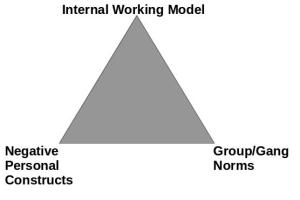Youth Work Strategy – At risk young people
Superkidz Community Trust has developed a new triple strategy for working with young people who are at risk of exploitation, crime and antisocial behaviour. It is based on over 20 years’ experience of youth work and expertise in individual and social psychology.
We have produced a replicable model of youth work and mentoring, focusing on young people such as young offenders and those at risk of child sexual exploitation. We also offer specialist training on the Transform model to partner organisations.

The Internal Working Model (IWM) is a concept developed by John Bowlby. It denotes an individual’s image of self and others, and the emotional responses to others and cognitive assumptions about them. It is formed in infancy and childhood. In many of the young people we work with this IWM has been shaped by abusive or neglectful experiences.
Negative Personal Constructs are conclusions drawn from experience and based on beliefs which are often false. An example is the conviction in some young people that they are unintelligent and untalented. This forms a barrier against aspirations and weakens resolve to gain skills and employment.
Group norms (rather than laws or abstract ethics) are a primary shaper of attitudes and behaviour. Negative group norms affect all strata of society from the most powerful and affluent to the most deprived. In youth gangs, an example of the group norm is rough justice and rejection of the police: It is acceptable for a victim of an assault to cause serious injury in a revenge attack. It is not acceptable to inform the police. Furthermore, pecking order in the gang is dependent upon committing daring crimes and asserting aggressive behaviours.
The result of Transform for girls is more robust self-esteem and ability to resist sexual exploitation, higher aspirations and better employability.
The result of Transform for boys is more reasonable behaviour, improved ability to empathise and relate to others outside the gang, or group, in a way that brings acceptance, rather than rejection, and better employability.